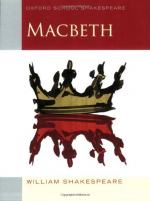|
This section contains 3,173 words (approx. 11 pages at 300 words per page) |

|
SOURCE: Hale, David G. “Order and Disorder in Macbeth, Act V: Film and Television.” Literature/Film Quarterly 29, no. 2 (2001): 101-6.
In the following essay, Hale discusses Macbeth's final act in various televised and cinematic versions of the play, many of which suggest a less positive conclusion than Shakespeare's original text provides.
Critical attention to the nature of ending in drama has been with us at least since Aristotle defined an end as “that which is inevitably or, as a rule, the natural result of something else but from which nothing else follows …” (Poetics 2.5; trans. Fyfe 31). Some sort of re-established family and/or political order is represented to indicate that an appropriate stopping point has been reached. This component of plot partially defines the difference between tragedy and history and their respective truths. In practice, however, literature (and not just modern and postmodern) has a great many endings which...
|
This section contains 3,173 words (approx. 11 pages at 300 words per page) |

|


